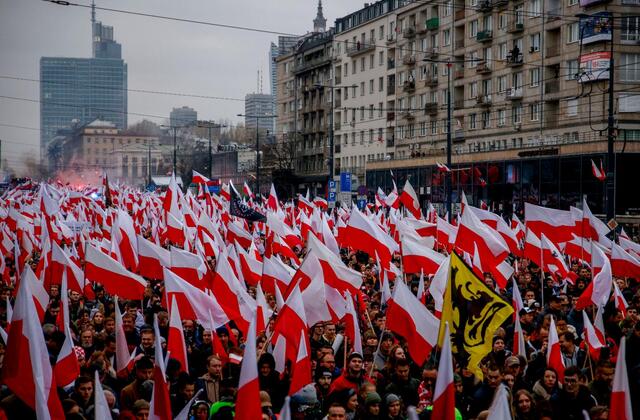Poland celebrated Independence Day yesterday, less than a month after the pro-European opposition won a majority in parliamentary elections.
The event, which takes place every year, drew thousands of people to the Polish capital Warsaw in what organisers called “the largest patriotic demonstration in Europe.”
The 38-million-strong Poland is known to host many patriotic events every year, but the annual Independence March has come to dominate the news as it is sometimes accompanied by xenophobic slogans and violence.
Marchers carried Poland’s white and red flag, some burning torches and holding Celtic crosses as they marched Saturday along a route leading from the city centre to the National Stadium. However, this time only 40,000 people took part in the event and it was peaceful, according to Warsaw Mayor Rafał Trzaskowski.
Although in the past the event has attracted far-right supporters from Hungary and Italy, this year’s march was attended by Paul Golding, leader of Britain’s small far-right Britain First party. The event was also attended by representatives of anti-abortion groups and featured Christian symbols.
Donald Tusk, the opposition coalition’s candidate for the next prime minister, did not attend, but said that “our nation is celebrating independence. The whole nation, all of Poland.”
But he also warned that those who use the occasion “to divide and sow hatred, he is acting against the nation.”
This modest number of people and peaceful atmosphere compared to last year (when more than 250,000 people took part) is related to the fact that the nationalist forces faced rejection of their worldview by voters. Voters also overwhelmingly supported centrist, moderate-conservative and left-wing parties after eight years of nationalist Conservative Party rule that was hostile to the European Union.
Law and Justice (PiS), the ruling right-wing nationalist party whose leaders have joined the march in the past, won the most votes but failed to win a parliamentary majority.
Many right-wingers believe that the election result, which was won by a coalition of the liberal Civic Platform, the conservative Third Way and the left-wing Left, will lead to a gradual erosion of the country’s independence.
We can expect – with a high probability – a change in EU treaties, which will affect Poland’s sovereignty and Poland’s independence in the international arena, and in particular within the European Union, Bartosz Malewski, head of the Independence March association, told reporters in October.
This is accepted by other participants in the demonstration.
For example, Grzegorz Zwick, who is a spokesman for the nationalist Niklot association, told Al Jazeera that he fears “federalisation of the European Union, cuts in military spending, and dismantling of social programmes.”
On Friday, it was reported that the opposition had signed a coalition agreement that paves the way for them to form a new government after they won a majority last month. President Andrzej Duda gave PiS the first attempt to form a government since PiS won a majority of votes.
Independence Day commemorates the restoration of Poland’s national sovereignty in 1918, at the end of World War I and after 123 years of rule by Prussia, Austria and Russia.
